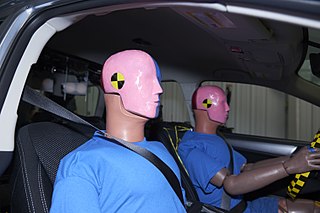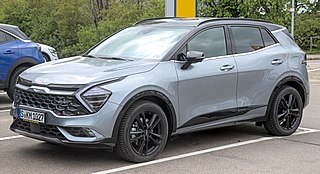
A crash test dummy, or simply dummy, is a full-scale anthropomorphic test device (ATD) that simulates the dimensions, weight proportions and articulation of the human body during a traffic collision. Dummies are used by researchers, automobile and aircraft manufacturers to predict the injuries a person might sustain in a crash. Modern dummies are usually instrumented to record data such as velocity of impact, crushing force, bending, folding, or torque of the body, and deceleration rates during a collision.

A crash test is a form of destructive testing usually performed in order to ensure safe design standards in crashworthiness and crash compatibility for various modes of transportation or related systems and components.

The Toyota Matrix, officially referred to as the Toyota Corolla Matrix, is a compact hatchback manufactured by Toyota Motor Manufacturing Canada in Cambridge, Ontario and derived from the Corolla. Introduced in 2002 as a 2003 model, the Matrix was the result of a joint venture between Toyota and General Motors, with the GM version being the Pontiac Vibe, which was assembled by New United Motor Manufacturing, Inc. (NUMMI) in Fremont, California, United States.

The Chevrolet Astro is a van that was manufactured and marketed by the Chevrolet division of American auto manufacturer General Motors from 1985 to 2005. Sold alongside the GMC Safari, the Astro was marketed in multiple configurations, including passenger minivan and cargo van.

The European New Car Assessment Programme is a European voluntary car safety performance assessment programme based in Leuven, Belgium. Formed in 1996, the first results were released in February 1997. It was originally started by the Transport Research Laboratory for the UK Department for Transport but later backed by several European governments, as well as by the European Union (EU). Their slogan is "For Safer Cars".

The Kia Sportage is a lineup of sport utility vehicles manufactured by the South Korean manufacturer Kia since 1993 through five generations. Initially a compact SUV built on a body-on-frame chassis, the second-generation Sportage transitioned to a car-based platform which placed it into the compact crossover SUV class, and has been developed alongside the Hyundai Tucson. Since the fifth-generation model launched in 2021, Kia developed the Sportage in two sizes with different wheelbase lengths for different markets.

The Pontiac Montana is a minivan that was sold by General Motors under the Pontiac brand for model years 1997 to 2009. Its badge-engineered variants were the Chevrolet Venture and the Oldsmobile Silhouette in the first generation, and the Chevrolet Uplander, Saturn Relay, and Buick Terraza in the second generation. Prior to the 1997 model year, it was known as the Pontiac Trans Sport.

The Chevrolet Uplander is a minivan manufactured and marketed by the Chevrolet division of General Motors for model years of 2005-2009, replacing the Venture and the Astro. Marketed over a single generation, the Uplander was offered in short and long wheelbase variations — each with foldable and removable second and third row seating; a V-6 engine and 4-speed automatic transmission.

The Toyota Sienna is a minivan manufactured and marketed by Toyota primarily for the North American market. It is named for the Italian city of Siena, in the region of Tuscany. It replaced the first generation Previa van in 1997 with a more conventional front-wheel drive layout and shares a heavily revised platform with the Camry. Both the Previa and original Sienna were smaller than the other minivans they competed against, but a redesign in 2003 increased the dimensions to match those of its competitors.

The Hyundai Sonata is a mid-size car that has been manufactured by Hyundai since 1985. The first generation Sonata, which was introduced in 1985, was a facelifted Hyundai Stellar with an engine upgrade, and was withdrawn from the market in two years due to poor customer reaction. While the nameplate was originally only sold in South Korea, the second generation of 1988 was widely exported.

The Insurance Institute for Highway Safety and Highway Loss Data Institute (IIHS-HLDI) is an American nonprofit organization. It was established in 1959, and it is noted for its safety reviews of vehicles in various simulated traffic situations, including the effectiveness of a vehicle's structural integrity and safety systems during a collision, in addition to examining improvement on such elements.

The Hyundai Accent, or Hyundai Verna is a subcompact car produced by Hyundai. In Australia, the first generation models carried over the Hyundai Excel name used by the Accent's predecessor. The Accent was replaced in 2000 by the Hyundai Verna in South Korea, although most international markets, including the US, retained the "Accent" name. The "Accent" name is an abbreviation of Advanced Compact Car of Epoch-making New Technology.

The Acura RDX is a compact luxury crossover SUV produced by Acura, a luxury vehicle division of Honda, as the second crossover SUV offering from the brand after the mid-size MDX. Initially sharing its platform with the Honda Civic and CR-V, with the third generation, the RDX uses its own platform.

The Kia K5, formerly known as the Kia Optima, is a mid-size car manufactured by Kia since 2000 and marketed globally through various nameplates. First generation cars were mostly marketed as the Optima, although the Kia Magentis name was used in Europe and Canada when sales began there in 2002. For the second-generation models, Kia used the Kia Lotze and Kia K5 name for the South Korean market, and the Magentis name globally, except in the United States, Canada, Malaysia and the Middle East, where the Optima name was retained until the 2021 model year. The K5 name is used for all markets since the introduction of the fifth generation in 2019.

The Kia Sorento is a mid-size crossover SUV produced since 2002 by South Korean manufacturer Kia.

A side collision is a vehicle crash where the side of one or more vehicles is impacted. These crashes typically occur at intersections, in parking lots, and when two vehicles pass on a multi-lane roadway.

A child safety seat, sometimes called an infant safety seat, child restraint system, child seat, baby seat, car seat, or a booster seat, is a seat designed specifically to protect children from injury or death during vehicle collisions. Most commonly these seats are purchased and installed by car owners, but car manufacturers may integrate them directly into their vehicle's design and generally are required to provide anchors and ensure seat belt compatibility. Many jurisdictions require children defined by age, weight, and/or height to use a government-approved child safety seat when riding in a vehicle. Child safety seats provide passive restraints and must be properly used to be effective. However, research indicates that many child safety restraints are often not installed or used properly. To tackle this negative trend, health officials and child safety experts produce child safety videos to teach proper car seat installation to parents and caregivers.

The restyled North American second generation Ford Focus was sold by Ford as either a two-door coupe and 4-door sedan — the hatchbacks and wagon were discontinued.
The head injury criterion (HIC) is a measure of the likelihood of head injury arising from an impact. The HIC can be used to assess safety related to vehicles, personal protective gear, and sport equipment.
Humanetics is a Digital Industrial Technology company, and a leading provider of safety systems, anthropomorphic test devices, crash test equipment, simulation software, CAE models, precision sensors, fiber optics and cutting-edge laser material engineering solutions.



















